Chef Kevin Mitchell
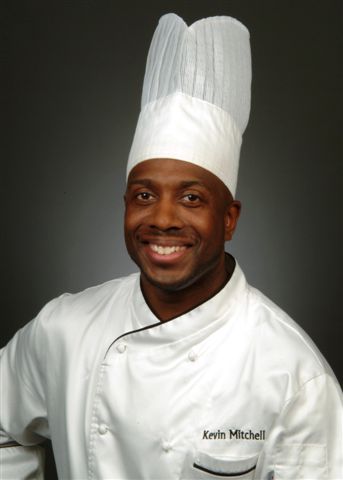
Chef Instructor, Culinary Institute of Charleston at Trident Technical College
Chef Kevin Mitchell’s culinary work embraces traditional American flavors, sumptuous soul food flair and delicate French cuisine. This broad mastery of global and regional techniques earned him the Grumpy Gourmet’s title of "Super Chef."
Kevin began his training as a young boy in his grandmother’s kitchen. This experience laid the foundation for his dedication to moving food from the fresh market to a white tablecloth, and he’s steadily climbed up the culinary ranks ever since.
A balance of home teachings with professional training has helped establish Kevin as the creator of tasty yet healthy fares. Yet his subtlety and refinements were born out of disciplined training earned at the prestigious Culinary Institute of America, where he holds two degrees – an Associate degree in Occupational Studies and a Bachelor of Professional Studies in Culinary Arts Management.
In 1996, he became Chef de Cuisine at the Marble Gang Restaurant and was also inducted into the Columbus Chapter of the American Culinary Federation. Since then, he’s held Sous Chef positions at the Wyandotte Restaurant and the Westin Great Southern Hotel. In 2000, he leftto become Executive Chef to Cornell University’s most popular dining facility on campus, Willard Straight Dining, which has hosted prestigious events such as "The Cross Country Gourmet," "Chinese New Year," "Year of the Snake" and Cornell’s traditional Festival of Black Gospel, infusing a French & Caribbean influence in traditional African American culinary presentations.
In 2002, Mitchell dedicated his culinary skills to the Sun Dial Restaurant located in the Westin Peachtree Plaza hotel in Atlanta, Georgia. The restaurant is one of few restaurants in the area that serve prime dry-aged beef. Since his time in Atlanta, Chef Mitchell has been inducted into the United Culinary Art Association.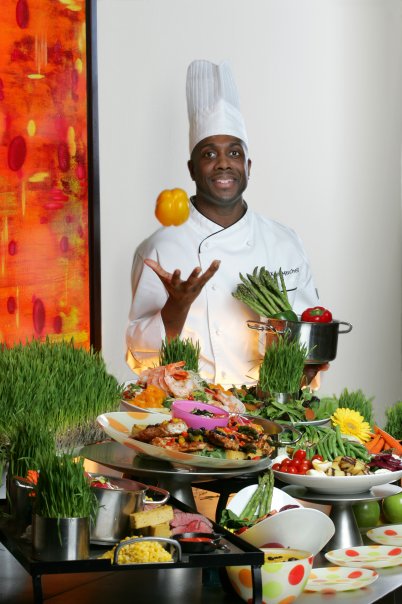
As Executive Sous Chef of the Westin Detroit Metropolitan Airport Hotel where he oversaw the hotel’s DEMA restaurant and banquet operations. The restaurant featured Asian inspired global cuisine.
Chef Mitchell became Palette Chef at the MGM Grand Detroit Hotel and Casino. It was herethat he oversaw all production of a 600 seat Tapas style buffet concept in the Casino with an average cover count of 1500 meals per day.
In December of 2008 Kevinl became Chef Instructor at the Culinary Institute of Charleston located within Trident Technical College in Charleston, South Carolina. At the Institute he is involved in designing new curriculum for new students as well as teaching classes. he also Mitchell ran 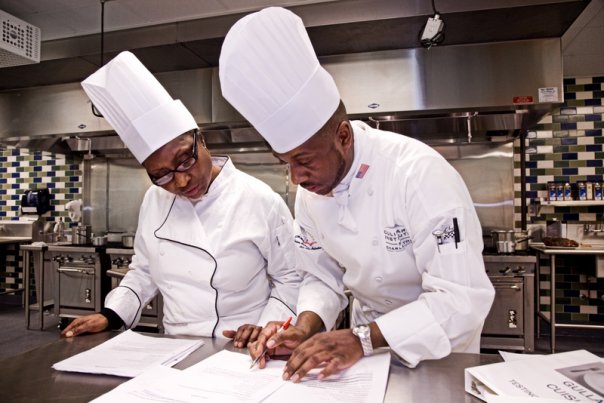 the test kitchen for the Gullah Cuisine cookbook, authored by Chef Charlotte Jenkins of Gullah Cuisine restaurant in Mt. Pleasant, SC., published by Joggling Board Press. Working with Chef Jenkins, he was the test chef for all the recipes in the book.
the test kitchen for the Gullah Cuisine cookbook, authored by Chef Charlotte Jenkins of Gullah Cuisine restaurant in Mt. Pleasant, SC., published by Joggling Board Press. Working with Chef Jenkins, he was the test chef for all the recipes in the book.
Chef is an active member of the American Culinary Federation, the National Association of Black Hotel Owners Operators and Developers as well as a founding father of the BCA, Bridging Culinary Awareness. Throughout his professional career, Chef Mitchell has maintained a commitment to promoting the value of professionally trained chefs, and he has volunteered his time and talents to various non-profit organizations where he has showcased his culinary skills.
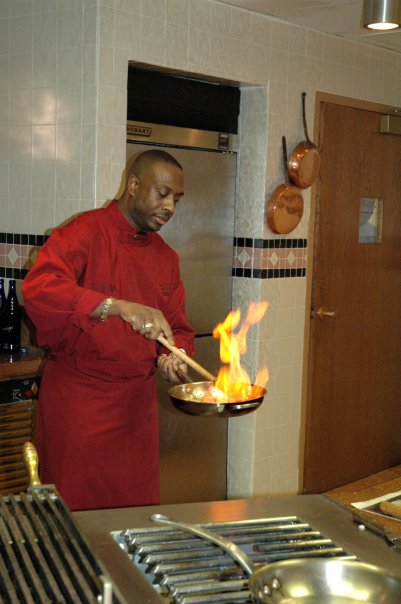 Tell us a little bit about yourself as a child. Where did you grow up?
Tell us a little bit about yourself as a child. Where did you grow up?
I grew up in a single parent home in Rahway, New Jersey, the second oldest of four boys.
How did you get into cooking?
I started cooking at age 6, when I learned how to cook for my grandmother.
Was that out of necessity?
I think my grandmother saw something in me that I didn't understand. At that age, and having 3 brothers, everyone wants to go out and play, and be 'boys.' My grandmother would keep me in the house. I'd try to convince her otherwise but she wouldn't budge. She would tell me, "Kevin, when you grow up and become a young man, you aren't going to always have your mother or grandmother around to cook meals for you, or clean your clothes, you need to learn." I view it as that she saw something in me that she didn't see in my brothers in putting me on this path to become a chef.
Yes, but you were only 6 six years old. What did you want to be when you grew up?
At that age I wasn't thinking I want to be a fireman or a policeman. I wanted to be in business and be a model, my friends used to laugh at me.
My grandmother used to put me on a stool in front of the kitchen sink and she taught me how to clean collard greens, snap green beans and how to wash chicken properly. I just acquired a love for it. When I was around 7, while watching the news, I saw something about the Culinary Olympics. All I remember were these tall guys in crisp white jackets and tall white hats cooking. From that point on, that's all I ever wanted to be. I ran into the other room shouting to my grandmother, "I know what I want to be when I grow up. I want to be a chef." When I entered junior high and high school, I took food service classes.
Tell us about your first job in the food industry.
I got my first restaurant job on my 16th birthday, a small French restaurant, Cafe Gallery, in the town I grew up in. They held art exhibitions in the restaurant once a month. I brought a letter of recommendation from my high school teacher with me. My first position was as the dishwasher, and when time allowed, I did prep work. Eventually they moved me through each of the stations.
I can't recall anyone that I've interviewed to date, who brought a letter of recommendation for their first job. I'm not talking about stage or after formal training, but as a high school student.
I had spoken with my instructor about wanting to get a job and he offered to write me a letter and sent me to this restaurant. I think he knew the owner. To this day I have no idea what was in that letter.
When did you decide to go to culinary school?
The chef in the restaurant was a graduate of CIA, others graduated from Johnson & Wales. The chef kind of kidnapped me. He told me to meet him at the restaurant one day when I had off under the auspices that we would 'hang out.'
Your chef kidnapped you?
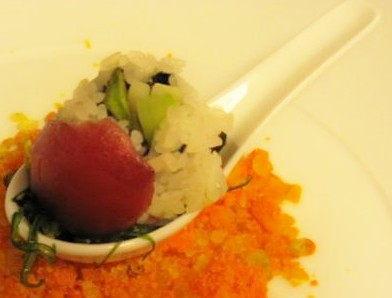 He grabbed me and another girl who was doing her externship and piled us in his car and took us to Hyde Park, NY, to the Culinary Institute. It wound up being an unofficial tour of the campus while classes were in session. From that moment, I knew the school I was going to would be CIA. I filled out papers while I was there!
He grabbed me and another girl who was doing her externship and piled us in his car and took us to Hyde Park, NY, to the Culinary Institute. It wound up being an unofficial tour of the campus while classes were in session. From that moment, I knew the school I was going to would be CIA. I filled out papers while I was there!
How long before you went to school?
I remember the day as if it was yesterday, April 1st, I received my acceptance letter. My mom called me at work and they patched the call into the kitchen. My mom told me a letter came from CIA and asked me if I wanted her to open it. I told her yes and she pulled out the first sheet and it was my acceptance letter. I had one month to prepare to move and report to school. I was so excited.
Share with us a special memory from CIA.
It was so regimented, the old guard of chefs (1989) ran things similar to being in the military. You'd line up and they would inspect your uniform, and send you back to to polish your shoes, or shave that 5 o'clock shadow. The chefs were very serious, ensuring you learned something every day you were in their class.
Most kitchens are not that regimented. Kitchens are like organized chaos. Working in an educational setting now, I have a different approach with culinary students. I try to prepare them for what the real world is like. If they want to strive to be on food TV, go ahead, but the majority of chefs will never attain that. I have students who live for shows like Top Chef and Hell's Kitchen. I just try to bring them back to the real world without stifling their enthusiasm.
Where did you do your externship?
In a country club in New Jersey.
The country club environment is very different from a restaurant.
There is a lot of sharing of ideas, seeking input from all of the staff. I've worked in kitchens that if you aren't the 'head cheese,' your insights are not encouraged. I don't work like that, I'm not ego driven. If there is someone in my kitchen that is skilled, I'm going to nurture and encourage them.
The business needs to be kept in perspective. Chefs are in the hospitality industry and the customer's satisfaction is the bottom line. There really isn't room for ego.
What is the most important thing in running your kitchen?
Mutual respect for each other.
Chefs who take what they do more seriously then who they are, are the most well-liked.
Definitely. Students are surprised that I don't talk about my accomplishments. I try to teach humility.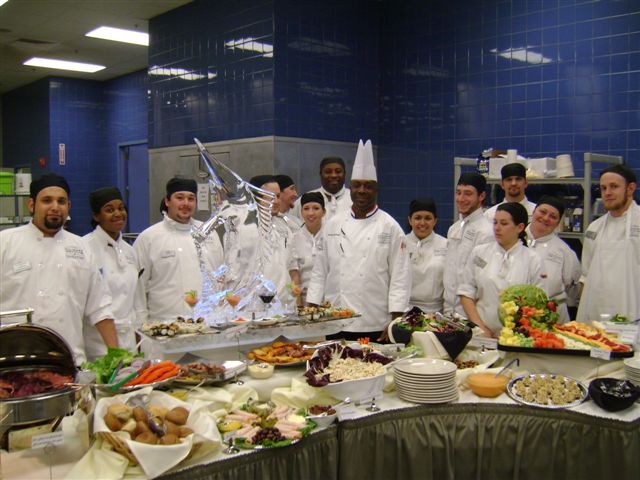 How did you end up in Michigan and Ohio?
How did you end up in Michigan and Ohio?
I had a friend, a CIA classmate, who was the general manager at a small restaurant in Ohio. It was really a rib joint and they wanted to take it to the next level. He invited me to go and check it out. I took a chance, I was only 26. I stayed there awhile and then went back to NY, for personal reasons, and went to work at Cornell University. I was at Cornell for 2 years and really missed being in a restaurant setting. I had sent my resume out to several places and a got a call from the Westin in Atlanta. I flew down and did a cooking interview. We sat down and discussed what I made and how I made it. He offered me the job on the spot. I was excited about working in Atlanta, there are a lot of great chefs and good food there. It was there that I had an opportunity to also handle the room service side of the business.
You've worked in a restaurant, country club, hotel, college food.....the only thing you haven't done is straight catering. (He chuckles). No one can't say that you aren't familiar with the many facets of the food/hospitality industry.
There is one thing that people who even know me don't know. At some point I would like to own my own hotel.
A corporate bed and breakfast?
(He laughs) I just find hotels fascinating. I would like to own a smaller, boutique style hotel.
So you're looking at a place like you would find in the Relais et Chateaux Guide.
Yes, exactly.
How did you end up being a culinary instructor?
I always thought in the back of my mind that I would enter into education at some point, but I thought it would be later on in my career. You know, when I would say to myself, "Okay Kevin, you're getting too old for this 80 hour a week thing. You have a family, you don't really see them. It's time to give this up."
While I was in Michigan, speaking to a friend of mine who is the president of the BCA, (whose mission is to increase the exposure and educational opportunities to people of color) I mentioned that I really wanted to get back to the south. I was tired of the cold weather in the north. A few weeks later he called me with an offer about teaching in Charleston, South Carolina. The school wanted an African American instructor.
I participated in a conference call interview with the appropriate individuals. Culinary educators operate at a very different 'speed' then say a chef in a restaurant. They wanted to be sure that I could SLOW down. A few weeks later they came out to see where I work and how I worked. I went through the process and they offered me the position. While touring the facility, before I accepted the position, I met one student that basically told me I needed to take this job. Their goal is to show that people of all colors have the skills and talent to pursue a career in the food/hospitality industry.
Are you enjoying the work?
It is an adjustment as I'm not working 80 hours a week. It allows me to do other things.
It allows you to have a life outside of the kitchen.
I'm entertaining getting my Master's next year and since I'm so heavily involved with ACF (American Culinary Federation), in also getting my Chef's Certification and things like that.
Do you believe that you didn't find culinary, rather it found you?
Without a doubt, it is a crazy business. It has to be in you and you have to want it. All the credit goes to my grandmother, she saw something.
Any trend you like more than another?
I am very interested in how molecular gastronomy works. I watch Richard Blaise (BLAIS, Atlanta) and Wiley Dufresne (WD50, NYC) I think we are going to be doing this for a long time. It is going to evolve into bigger and better things as the years go by.
There is such a plethora of technology out there that I believe the limits are far reaching. You and I are both on Facebook, the bulk of my friends are chefs, for a reason. When I see the creations they post, I am in awe at the amount of genius that is out there. We limit ourselves if we look just at TV for inspiration. I would love to spend my entire day in the kitchen just creating, but my job is more than creating recipes and cooking. That is just one facet of my passion. You need access to all types of equipment, to attempt things like molecular gastronomy, and schools have such equipment. The average restaurant does not have the capital to invest in equipment.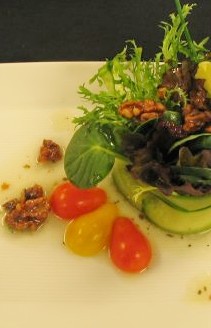 I love the Alinea cookbook. What Grant Achatz is doing is fantastic. The other day I had an egg made sous vide. When the egg was cracked on my plate and I tasted it, I decided it was the egg I have to have in my Eggs Benedict. (Laughing) We have been working with sous vide with the students.
I love the Alinea cookbook. What Grant Achatz is doing is fantastic. The other day I had an egg made sous vide. When the egg was cracked on my plate and I tasted it, I decided it was the egg I have to have in my Eggs Benedict. (Laughing) We have been working with sous vide with the students.
Is there a trend you wish would go away?
No, I just love food. If you are going to do it, do it right. I've heard chefs refer to fusion as con-fusion. (Laughing) I like working with New Southern Cuisine, not hesitating to put truffles with grits in a minute, over foie gras!
Do you have a favorite spice?
I love peppercorns. There's nothing better to me than a nice Caesar Salad with fresh black pepper.
What does your family like you to make?
Anything with fish, I am a really big fish guy. The fresher the better.
Do you have a favorite kitchen gadget?
I love my mandoline. I have both the regular and Japanese mandolines.
You have to have a technique to play the (kitchen) mandoline, do you agree?
I certainly do.
Best cooking tip for a novice.
You have to have a love for it. Happy cooks, happy food. Mad cooks, mad food. (Laughter)
What is the most embarrassing thing that has ever happened to you in the kitchen?
(He is laughing a lot here) When I first started working, we were making gallon upon gallon of stock and you have to strain it through a chinois, and the carrots, and all those things, we throw out. It's still very hot. I dragged the can out to the dumpster and when I lifted the bag out of the can, it had melted the bottom of the bag and all the trash came flying out, all over the ground and the inside of the dumpster. I cleaned up the ground, that wasn't the worst part. I then had to get inside the dumpster and scrub that. That is not a very nice smell. There is a chemical called 'dumpster breath,' supposed to smell like lemon. It didn't do anything for it. (Laughing)
Is there a food you can't bring yourself to eat?
No, I will try anything.
Is there a food that you tried and after you did you asked yourself, "Why?"
Salmon caviar.
What is the greatest stress that you have as an instructor?
It takes a lot more planning. You have to make lesson plans and keep your students on task. Banging out 500 covers is easy for me. Going into a classroom with 15-16 students looking at you to guide them, can be stressful.
Greatest joy as an instructor?
At the end of the day or semester, when a student comes and tells me that they enjoyed my class and learned something.
What are the most important qualities that make a successful chef?
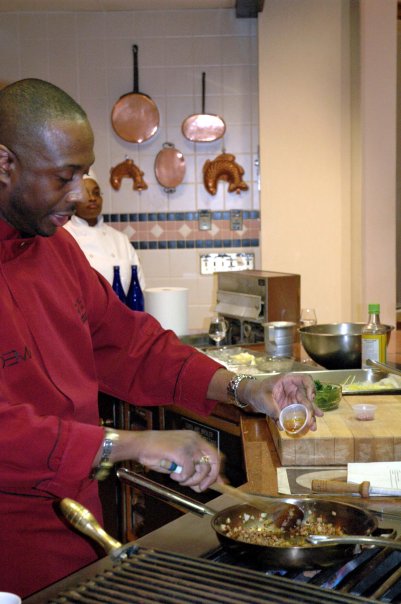 Outside of being creative, dedicated and compassionate. Chefs at times will be someone's mother, father, referee or counselor. It's not always about the cooking.
Outside of being creative, dedicated and compassionate. Chefs at times will be someone's mother, father, referee or counselor. It's not always about the cooking.
As an 'educator' you have a third hat that you wear. You have to be the psychologist.
This is our Dead Chef Walking question. What would your last meal on earth be?
For me it wouldn't be what but rather who. I would want my grandmother to prepare all her specialties. Macaroni and cheese, roast beef, sweet potato pie and a big hunk of foie gras.
Anything else that you would like to share?
You have to be dedicated to this profession. It is a lot of work and you can't think you are going to walk in and become the greatest chef overnight. It is a journey not a destination.


